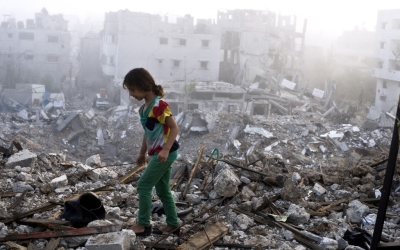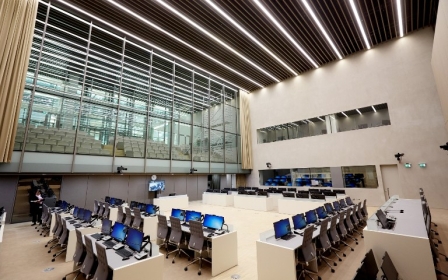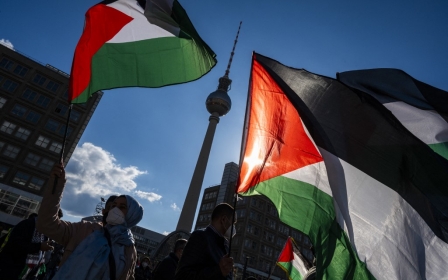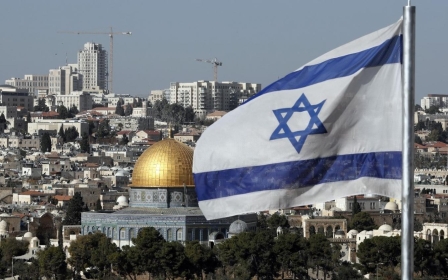ICC: Justice for Ukraine, not Palestine
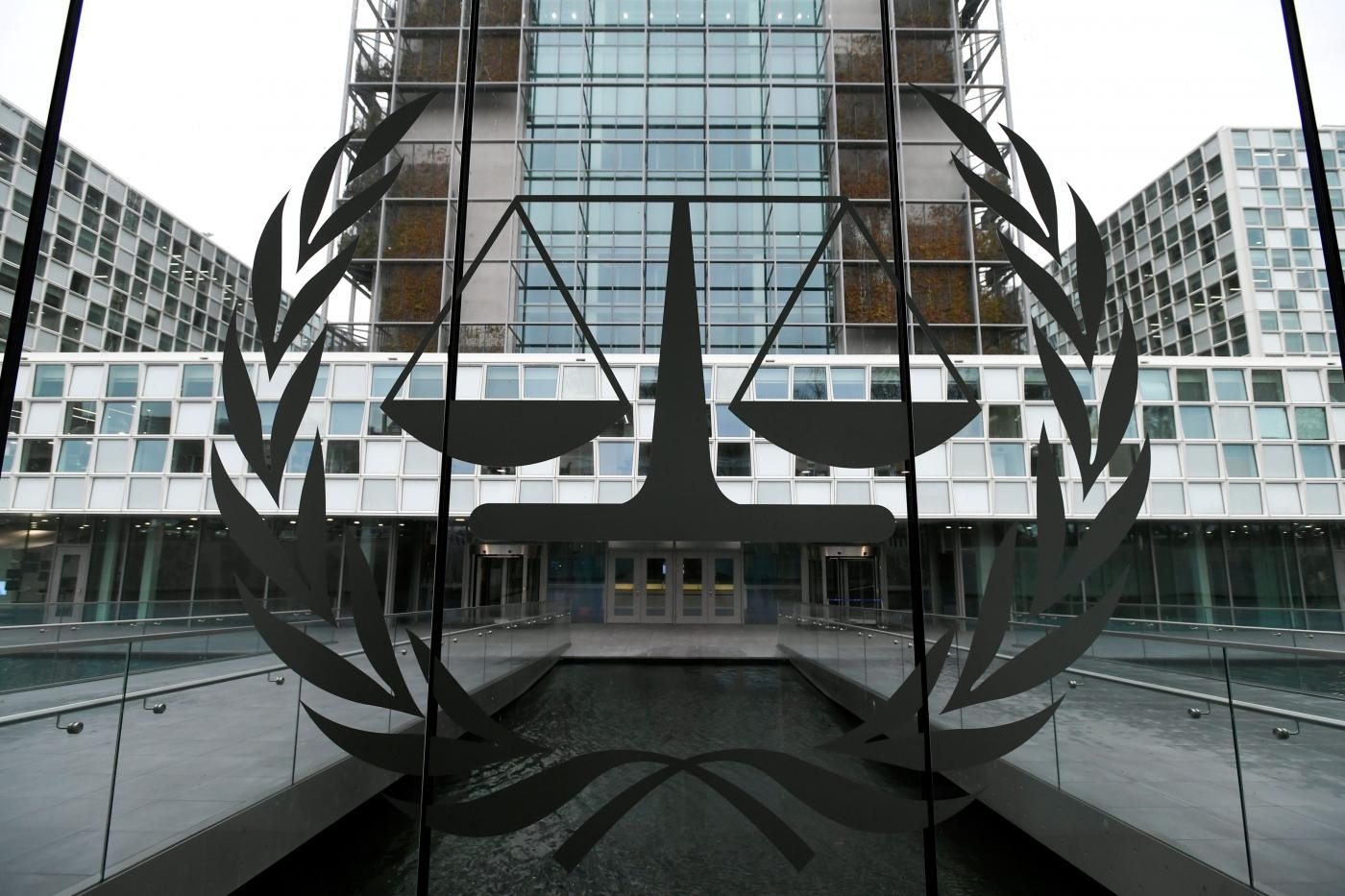
On 2 March 2022, 39 countries, including all EU member states, Australia, Canada, Iceland, New Zealand, Norway, Switzerland and the United Kingdom, requested the International Criminal Court (ICC) investigate alleged war crimes and crimes against humanity in Ukraine. The ICC’s prosecutor Karim Khan accepted the request immediately.
A year earlier, on 3 March 2021, the former ICC prosecutor Fatou Bensouda officially decided to investigate similar crimes alleged to be committed in the Occupied Palestinian Territories (OPT) since 13 June 2014, as requested by the State of Palestine on May 2018.
New MEE newsletter: Jerusalem Dispatch
Sign up to get the latest insights and analysis on Israel-Palestine, alongside Turkey Unpacked and other MEE newsletters
The intended investigation only covers a microscopic purview of the Israeli crimes since 1948. In particular, it is expected to attend to the Israeli military attacks on Gaza, the killing of thousands of Palestinian civilians and six Israeli civilians.
Israeli forces indiscriminately killed 1,462 Palestinian civilians, a third of them were children, during Operation Protective Edge, which resulted in the colossal destruction of civilian infrastructure according to a UN Report. It will also consider the illegal Jewish settlements in the West Bank and East Jerusalem, which are already considered to be a war crime.
For the Palestinians, the ICC’s investigation would provide a glimmer of hope that some level of accountability and an end to the Israeli impunity might be forthcoming this time around. Israel intensely rejected it. Its former prime minister Benjamin Netanyahu attacked the decision as "biased" and "the essence of anti-Semitism and hypocrisy".
Obstructing justice
The ICC’s decision on Palestine was three years overdue. The court and its personnel were confronted with enormous political pressure and intimidation, even sanctions, in an attempt to bar the possibility of holding an investigation.
As a pre-emptive response, the United States, under the Trump administration, not just opposed the probe, but also imposed sanctions on the ICC’s prosecutor and her senior colleagues, and placed them on the list of "specially designated nationals" along with the US-designated terrorists and criminals.
Although in April 2021, the Biden administration lifted the sanctions, it continues to strongly oppose any role of the ICC in Palestine. It also repeatedly contested the ICC’s judgment on its own jurisdiction over the OPT, as determined by Pre-Trial Chamber I. The Biden administration expressed “serious concerns about the ICC’s attempts to exercise its jurisdiction over Israeli personnel”.
The ICC is just one example that highlights a consolidated pattern of western policy and practice that has consistently obstructed Palestinian access to justice
Germany, a self-declared strong supporter of the ICC, publicly disputed the court’s independent ruling. The German President Frank-Walter Steinmeier alleged that ICC has no jurisdiction over the OPT.
In the so-called amicus curiae (friend of the court) brief the German government intimated that the ICC and the Office of the Prosecutor "do not have jurisdiction because of Palestine’s lack of statehood in international law", while emphasising that a Palestinian state can be achieved "only through direct negotiations" between Israel and the Palestinians.
The latter addition is no less than a short step for the formal exclusion of the Palestinians (and potentially other subjugated nations) from the remit of international law and jurisdiction.
A 'culture of exceptionalism'
Hanan Ashrawi, a prominent Palestinian politician, denounced the idea that a state can simply supersede the ruling of the ICC judges and numerous resolutions of the UN.
She tweeted - in response to Germany’s Foreign Minister Heiko Maas's objection to the ICC’s decision - mocking western double standards and proclaimed judicial superiority over the ICC judges and United Nations.
In addition to Germany, Austria, the Czech Republic, Hungary and Lithuania disputed the ICC’s previous ruling that affirmed its competence and authority.
The situation is surreal. Even countries like the Czech Republic and Hungary, which officially recognise the statehood of Palestine and host Palestinian embassies in their capitals, petitioned their own position, and contended that Palestine is not a state.
While other western countries, including Australia and Canada, echoed a similar legal discourse (lack of statehood), the UK openly opposed the ICC’s investigation on the ground that "a friend and ally", that is Israel, must not be questioned.
The ICC is just one example - among many - that highlights a consolidated pattern of a western policy and practice of double standards that have consistently obstructed Palestinian access to justice and universal standards of human rights.
It is not a coincidence that international law, despite its ahistorical approach to the question of Palestine, has been entirely omitted from the EU–US-led Middle East peace process.
This omission “permitted a culture of exceptionalism to prevail” in Israel, as the special rapporteur for the situation of human rights in the OPT Michael Lynk said. While the same governments that - aptly- solicited the ICC in the situation in Ukraine, have been deliberately using legal and political tactics to delay and obstruct a similar investigation in Palestine.
Notorious tactics
Anyone familiar with the prolonged legal struggles in the case of Palestine knows too well that such notorious tactics have become the prevailing principles, rather than just a singular occurrence, geared towards the repudiation of justice and accountability in Palestine.
The pursuing of justice in Ukraine, while at the same time publicly or tacitly obstructing it in Palestine, is to render the Israeli violations and crimes as exceptions and the culprits to be non-prosecutable
Although justice delayed is no less than its denial, these efforts and tactics go beyond this ancient maxim. They are predicated upon the desire to remove the entire system of justice and international law from the victims’ menu of options.
The pursuing of justice in Ukraine or anywhere else, while at the same time publicly or tacitly obstructing it in Palestine, is to render the Israeli violations and crimes as exceptions and the culprits to be non-prosecutable.
In doing so, these liberal and democratic governments - and "strong" supporters of the ICC and international law more generally - not just contribute to the culture of impunity and double standards, but also reproduce the exception into the customary practice and norm.
The views expressed in this article belong to the author and do not necessarily reflect the editorial policy of Middle East Eye.
This article is available in French on Middle East Eye French edition.
Middle East Eye delivers independent and unrivalled coverage and analysis of the Middle East, North Africa and beyond. To learn more about republishing this content and the associated fees, please fill out this form. More about MEE can be found here.




